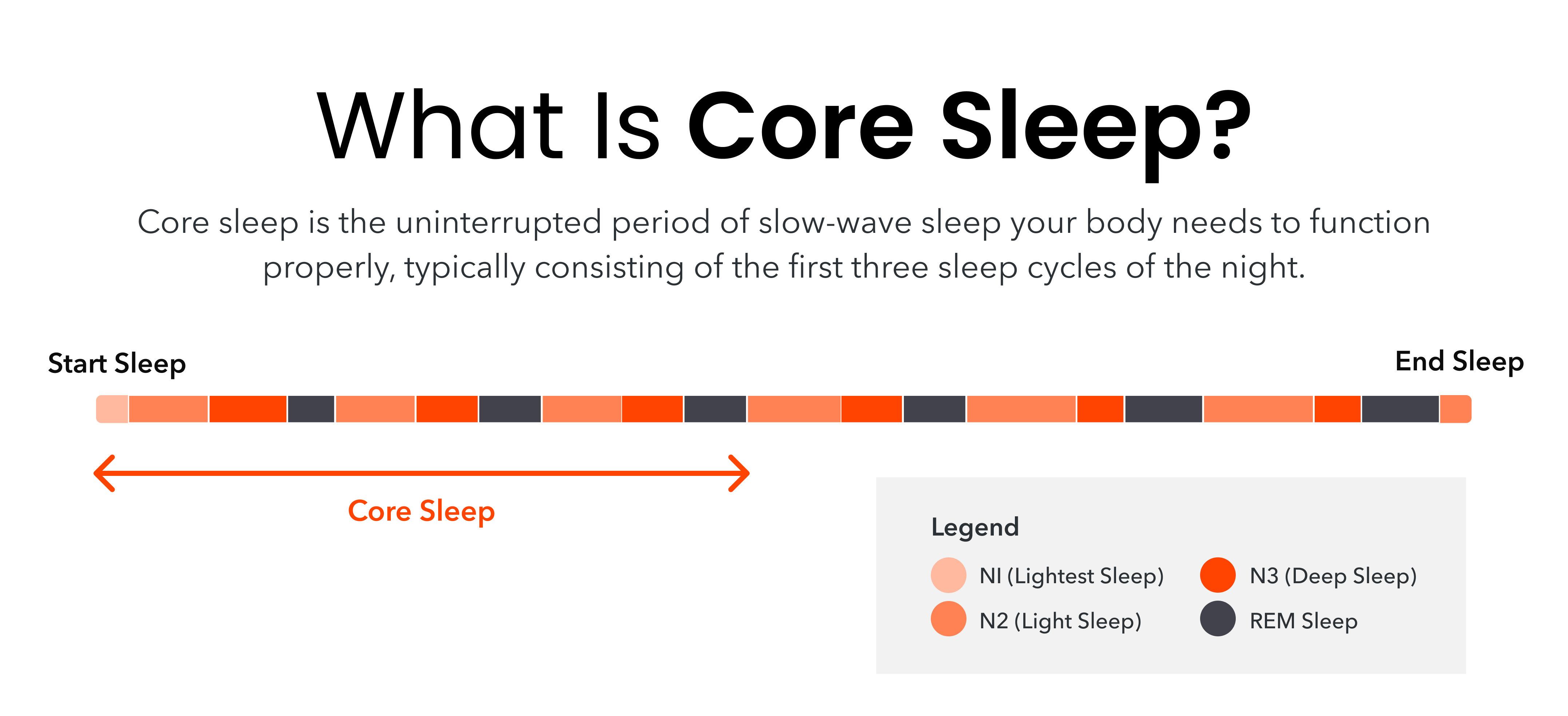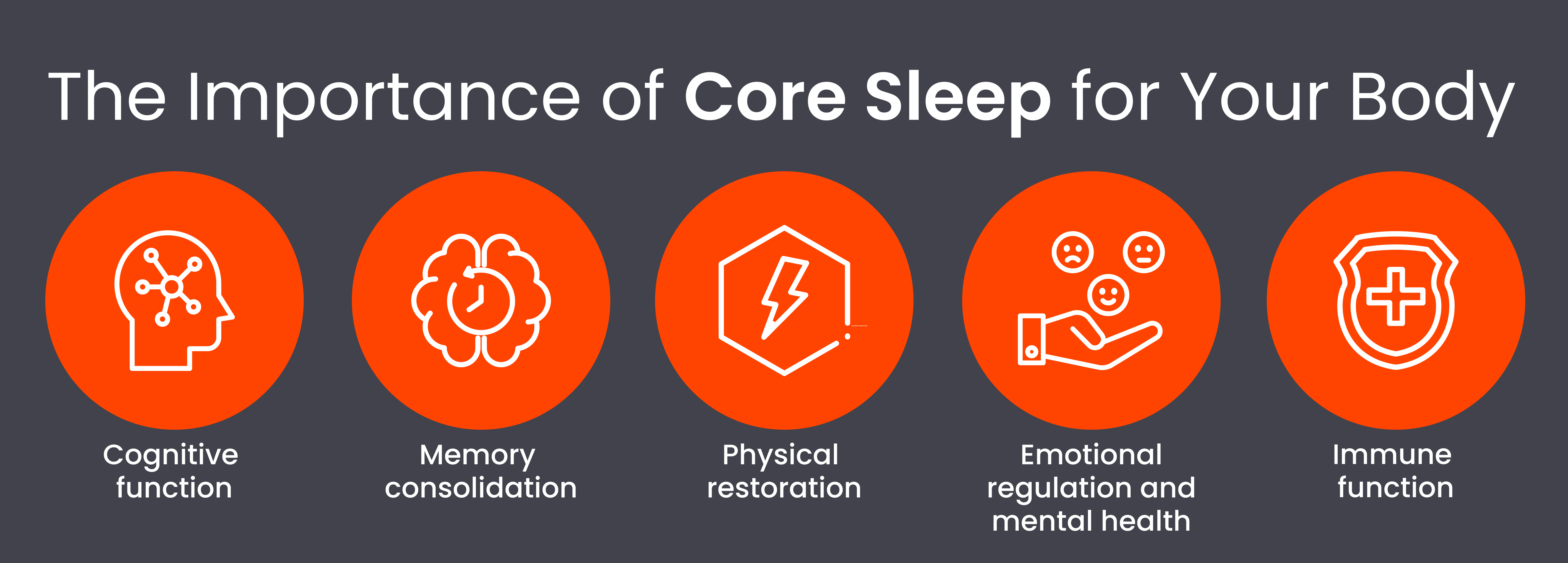Core Sleep: Importance & Impact of Core Sleep on Total Body Health

But what is core sleep, and how can you make sure you’re achieving it? Keep reading to learn more about core sleep, its importance, how it differs from other sleep stages, and how you can optimize your sleep for better health.
- Key Takeaways
- What Is Core Sleep?
- How Long Should You Be in Core Sleep?
- What Is the Difference Between Core Sleep vs. Deep Sleep?
- Why Is Core Sleep Important for Your Body?
- What Factors Impact Core Sleep?
- What Are Signs of Poor Core Sleep?
- How Can You Improve Core Sleep?
- Wrapping Up: Understanding Core Sleep
Key Takeaways
- Core sleep refers to the essential part of our sleep cycle, which occurs during slow-wave sleep.
- The amount of core sleep someone needs varies by individual and age.
- Core sleep is crucial for cognitive function, memory consolidation, physical restoration, emotional regulation, and immune function.
- Factors such as stress, caffeine, alcohol, blue light exposure, and sleep environment can significantly impact the quality of core sleep.
What Is Core Sleep?
Core sleep is a fundamental concept in sleep science that represents the essential part of our nightly rest. Sleep scientist James Horne coined the term core sleep in 1985 to refer to the “obligatory” sleep our bodies and brains need to promote growth and repair. To understand core sleep, we need to discuss the structure of our sleep cycles and the different stages that make up our nightly slumber.

You may know that there are several sleep cycles and stages of sleep, including:
- Non-REM sleep: NREM sleep consists of three stages of sleep in which you slowly sink into a deeper and deeper sleep. In stage 1, your sleep is light. In stage 2, your heart rate slows, your body temperature drops, and you begin falling into a deeper sleep. In stage 3, you’ll experience deep sleep, also known as slow-wave sleep. During this stage, it’s hard to wake you up because your brain waves are very slow.
- REM (rapid eye movement) sleep: REM sleep is characterized by rapid eye movements, increased brain activity, and vivid dreams. Your arm and leg muscles prevent you from acting out your dreams.
Throughout the night, your body goes through numerous sleep cycles consisting of NREM and REM sleep, cycling between stages 1 through 3 and REM sleep. Generally, most adults will experience 4 to 6 sleep cycles per night when getting 8 hours of sleep, which can last between 80 to 100 minutes.
Sleep researchers like Horne have proposed a distinction between what they call “core” sleep and “optional” sleep to help us better understand the critical components of restorative sleep. Core sleep primarily consists of slow-wave sleep, typically in the first three cycles of sleep during the night. It’s during this time that your body does much of its physical repair and regeneration.
The remaining 1 to 3 sleep cycles of your night’s sleep are considered “optional” sleep, which, while still beneficial, may not be as important for basic functioning as core sleep.
How Long Should You Be in Core Sleep?
There is no definitive answer to how much core sleep we need each night. As stated, each sleep cycle lasts about 80 to 100 minutes, and when sticking to Horne’s definition of core sleep that occurs during the first three sleep cycles of the night, most people who sleep 8 hours a night may want to aim for roughly 5 hours of core sleep. However, it’s recommended to ensure you’re getting enough sleep overall because non-REM and REM sleep are both essential for your well-being.
With that said, how much sleep you need can vary depending on several factors, including:
- Age: As we age, our sleep patterns and needs change. While a young adult might require closer to 10 hours of sleep, an older adult might function well with closer to 7 hours.
- Individual differences: Just as some people need more total sleep than others, some individuals might require more or less core sleep to feel fully rested and function optimally.
- Sleep quality: If your sleep is interrupted or of poor quality, you might need a longer period of core sleep to achieve the same restorative effects.
What Is the Difference Between Core Sleep vs. Deep Sleep?
To understand the difference between core sleep vs. deep sleep, it’s essential to recognize that we’re comparing two different concepts in sleep science.
Deep sleep is a specific stage of sleep. It’s another name for non-REM stage 3 sleep, characterized by slow brain waves.
On the other hand, core sleep is not a sleep stage. Instead, it’s a concept of sleep organization proposed by sleep researchers trying to determine which part of sleep is the most important. Core sleep occurs in the first 3 sleep cycles of the night. It is not a sleep stage itself.
Why Is Core Sleep Important for Your Body?
Core sleep helps maintain our overall health and well-being. Here’s why it’s so important:

- Cognitive function: Core sleep enhances brain performance, improving focus, problem-solving, and decision-making abilities.
- Memory consolidation: During core sleep, your brain processes and stores information, strengthening memories and aiding learning.
- Physical restoration: This is when your body repairs tissues, builds muscle, and releases growth hormones.
- Emotional regulation and mental health: Core sleep helps balance mood and emotions, reducing the risk of mental health issues.
- Immune function: Quality core sleep keeps your immune system in top shape so your body can fight off infections and diseases more easily.
What Factors Impact Core Sleep?
The quality and quantity of your core sleep can be influenced by various factors in your daily life and environment. Understanding these factors can help you find potential sleep disruptors and take steps to improve your core sleep. Here are some factors that can impact your core sleep:
- Stress: High stress levels can activate your body’s “fight or flight” response, making it difficult to relax and fall into a deep sleep.
- Caffeine and alcohol: Caffeine, a stimulant, can delay sleep onset and reduce sleep depth. Alcohol, while initially sedating, can disrupt sleep later in the night, reducing overall sleep quality.
- Age: As we get older, our sleep patterns naturally change. Older adults often experience lighter sleep, more frequent awakenings, and less time in deep sleep stages, all of which can affect core sleep.
- Blue light: Blue light from screens before bedtime can suppress melatonin production, making it harder to fall asleep and potentially delaying the onset of core sleep.
- Medical conditions: Certain medical or health issues, such as sleep apnea, chronic pain, or mood disorders, can significantly impact sleep quality and duration, affecting the restorative nature of core sleep.
- Sleep environment: Factors like room temperature, noise levels, light exposure, and bed comfort can all influence whether or not you can fall and stay asleep.
What Are Signs of Poor Core Sleep?
Recognizing the signs of poor core sleep is crucial for identifying and addressing sleep issues that may be affecting your health. If you’re not getting enough quality core sleep, you may experience several telltale symptoms. Here are some common indicators:
- Fatigue: Feeling persistently tired throughout the day, even after seemingly getting enough sleep, is known as excessive daytime sleepiness and can be a sign of poor core sleep quality.
- Poor cognitive function: Difficulty concentrating, memory issues, and reduced problem-solving abilities may indicate insufficient core sleep.
- Mood swings: Increased irritability, emotional instability, or unexplained changes in mood can result from inadequate core sleep.
- Interrupted sleep: Frequently waking up during the night or having trouble staying asleep can disrupt your core sleep cycles.
- Lack of energy: Feeling sluggish, unmotivated, or lacking the energy to complete daily tasks may suggest poor core sleep quality.
- Increase in sickness: A weakened immune system due to poor core sleep can lead to more frequent illnesses or longer recovery times.
How Can You Improve Core Sleep?
By making some lifestyle changes and adjusting your sleep environment, you can enhance both the quality and quantity of your core sleep. Here are a few ways to improve core sleep:
- Improve sleep hygiene: Give yourself a relaxing bedtime routine to tell your brain it’s time to wind down for sleep. Wake up at the same time every day to feel more energized throughout the day.
- Try sleep aids: If you find yourself struggling to fall asleep at night, try natural sleep aids, like melatonin or a weighted blanket, that help you drift off more easily.
- Invest in a comfortable memory foam or hybrid mattress: Ensure your sleep surface provides proper support and comfort for your body, promoting uninterrupted core sleep.
- Reduce caffeine and alcohol intake: Don’t drink caffeine or alcohol too close to bedtime.
- Create a comfortable sleep environment: Optimize your bedroom for sleep by controlling temperature, reducing noise, and minimizing light exposure. You can also add comfortable bedding like comforters and bamboo sheets and use white noise to sleep by drowning out distracting sounds.
- Limit screen time before bed: Turn off your devices to limit blue light exposure in the evening to support your natural sleep-wake cycle. Instead, consider red light therapy for sleep, which can help increase melatonin production to help you sleep.
- Manage stress: Try relaxation techniques to calm your mind before bed. These activities can be anything from breathing exercises to reading or yoga.
- Exercise regularly: Physical activity during the day reduces stress and uses up any extra energy you might have that can affect your sleep.
Wrapping Up: Understanding Core Sleep
Core sleep is a fundamental aspect of our overall health and well-being, playing a crucial role in physical restoration, cognitive function, and emotional regulation. By understanding what core sleep is, recognizing its importance, and implementing strategies to improve it, you’re taking significant steps toward better health.
Ready to take your core sleep to the next level? Consider upgrading your sleep surface with a memory foam mattress from Layla. Browse our collection today.






